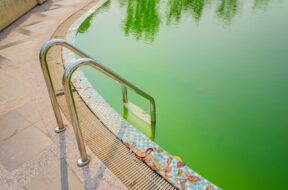

Want to learn more about algaecide? Read on to find out when to add algaecide to your pool maintenance routine and other helpful tips.
Learn how to clean and maintain your saltwater or chlorine swimming pool and hot tub.
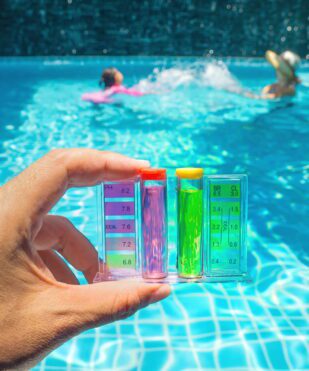
This article describes the chemistry involved in keeping your pool or hot tub safe and your water crystal clear.

Here are some ways you can make swimming safer and more healthy for your dog and the entire family.
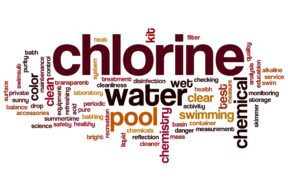
Chlorine is the most important chemical when it comes to maintaining sparkling clean water that is safe to swim in. Chlorine sanitizes your pool water by attacking and killing harmful microorganisms, called contaminates, that could lead adverse health consequences. Therefore, it is critical to know how to test the chlorine in your pool or hot tub, as well as what to do when your chlorine levels are outside recommended ranges.
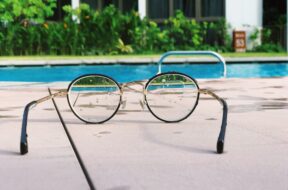
New to owning a swimming pool? This article explains water testing and what you need to know to keep your pool water clear and balanced.
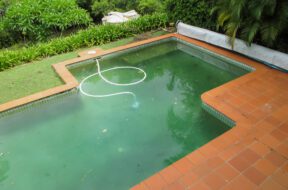
Pool algae is an unfortunate yet common problem many pool owners face. This article describes the types of algae and how you can prevent it.

Total alkalinity is similar and correlated to cyanuric acid. It’s not as volatile as free chlorine or pH and doesn’t require frequent testing.
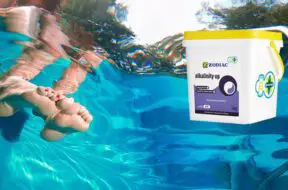
Swimming Pool alkalinity (often called total alkalinity) is a measurement of the concentration of alkaline materials in your pool. Alkaline materials stabilize pH but buffer chlorine sanitation.
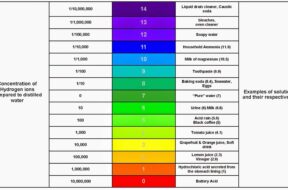
Maintaining both pH and total alkalinity in your swimming pool is important for keeping your pool properly sanitized and non-corrosive. Total alkalinity is to pH what cyanuric acid is to free chlorine. Total alkalinity stabilizes pH levels. The ideal pool pH level is 7.4 to 7.6. The ideal total alkalinity level is 80 to 120 ppm.
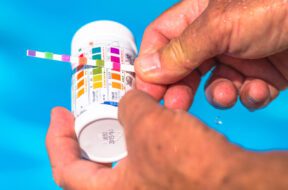

You should test your pool pH level as often as you test free chlorine – about twice per week. To raise pH use borax or soda ash (aka washing soda). To lower pH use muriatic acid.
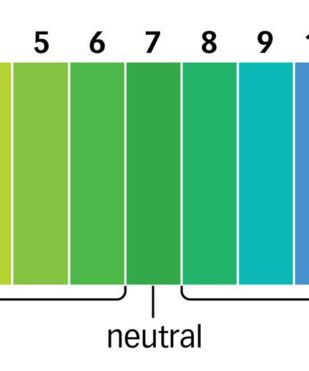

The ideal pH level in both swimming pools and hot tubs is 7.4 to 7.6. This is the level where water is most comfortable for swimmers while also maximizing chlorine’s sanitizing ability.
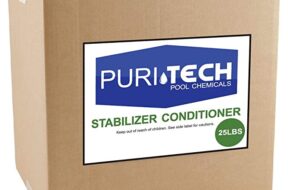

There are three types of pool stabilizer: stabilized chlorine, liquid stabilizer, and granular stabilizer. Which type of stabilizer you should use is largely a matter of personal preference. Learn more about pros and cons of each.
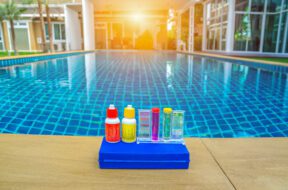

Test strips are the easiest way to test cyanuric acid. Cyanuric acid is raised by adding chlorine stabilizer containing cyanuric acid. The only way to lower cyanuric acid is by replacing water.
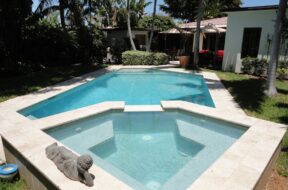

The suggested cyanuric acid level depends on the amount of direct sunlight your pool receives and whether you use a salt chlorine generator.


Temperatures are dropping and fall has arrived! Now is the time to start thinking about winterizing your above ground swimming pool.
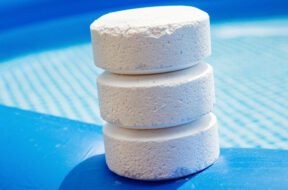


The Association of Pool and Spa Professionals recommends free chlorine levels for both swimming pools and hot tubs be kept between 2.0 and 4.0 ppm. However, the Center for Disease Control recommends free chlorine stay above 1 ppm in pools and 3 ppm in hot tubs.
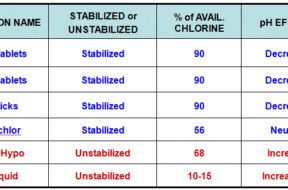

Sanitizers come in liquid, powder, and tablet form, and many pool owners have questions about the differences between them. In this article, we will get your questions answered.
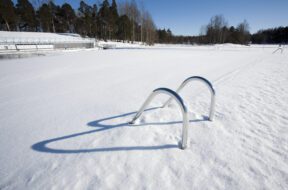

Winterizing your pool doesn’t need to be difficult. You need to plan on spending a few hours over the course of about a week to go through all of the steps.
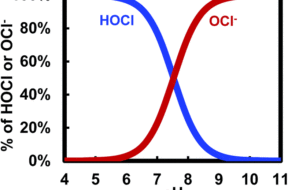

Learn the relationship between chlorine and cyanuric acid, and how cyanuric acid stabilizes the free chlorine in your pool.
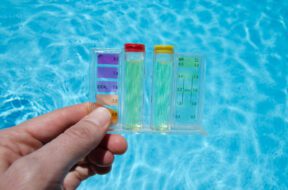

In general, chlorine levels should be tested at least twice per week. However, the answer to this question depends heavily on how often your swimming pool is used, who uses your pool, and weather events that may introduce a large amount of fresh water into your pool.
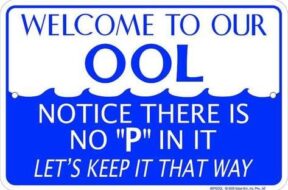

There are is a lot of misunderstanding about how chlorine works to kill harmful contaminants in pool water, as well is misconceptions about what type of contaminants chlorine will kill efficiently. In this article, we cover 5 important things free chlorine will kill in your swimming pool or hot tub water.
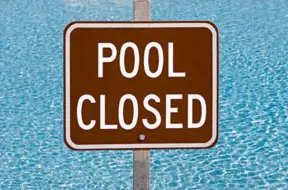

Winterizing your pool correctly makes sure it’s ready for the next season. Here’s some guidelines to help you decide when to close your pool.
Some dogs are not good swimmers. Examples of dogs that are not safe by the pool include basset hounds, bulldogs, dachshunds, pugs and boxers
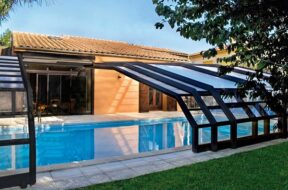

Pool enclosures are structures that surround your pool. They are gaining popularity for the benefits they provide, including: privacy and security, protection against debris, and year-long pool enjoyment.
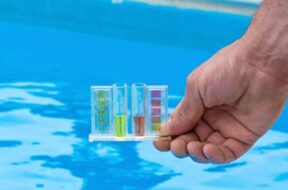

Want to know what the different types of chlorine mean? Read on to learn about Free chlorine, combined Chlorine, and Total chlorine.
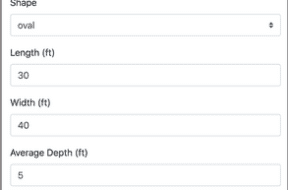

The Pool Volume Calculator makes it easy to calculate the volume of rectangular, oval, and circular pools quickly.
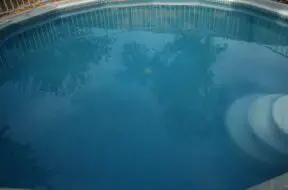

There are few things that can spoil your day more than cloudy water in your pool. Testing your pool chemistry can help find the problem.


Testing your pool helps keep your water safe from viruses, bacteria, and algae, and ensures chemical levels are safe and comfortable.


Want to learn more about algaecide? Read on to find out when to add algaecide to your pool maintenance routine and other helpful tips.
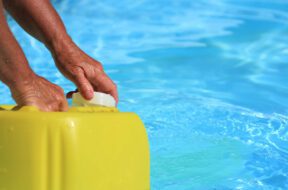

In this quick guide, we’ll answer the question “can you over shock a pool” and unveil the factors to consider when shocking a pool.



Maintaining both pH and total alkalinity in your swimming pool is important for keeping your pool properly sanitized and non-corrosive. Total alkalinity is to pH what cyanuric acid is to free chlorine. Total alkalinity stabilizes pH levels. The ideal pool pH level is 7.4 to 7.6. The ideal total alkalinity level is 80 to 120 ppm.



The Association of Pool and Spa Professionals recommends free chlorine levels for both swimming pools and hot tubs be kept between 2.0 and 4.0 ppm. However, the Center for Disease Control recommends free chlorine stay above 1 ppm in pools and 3 ppm in hot tubs.